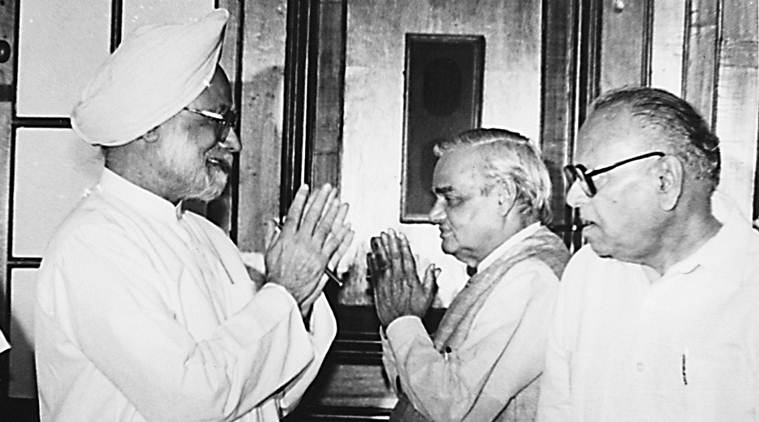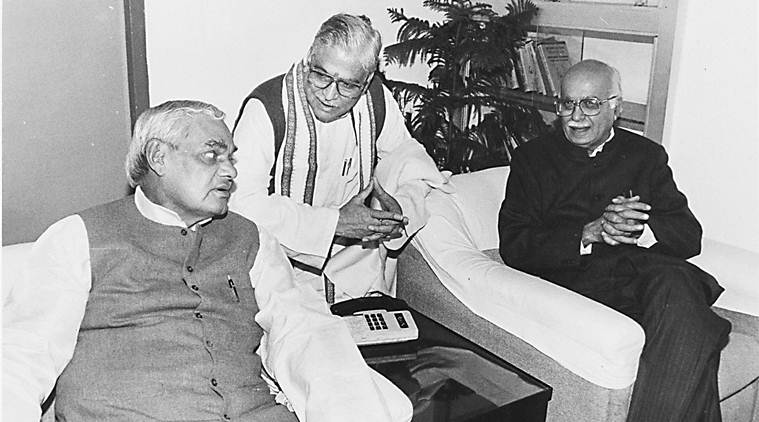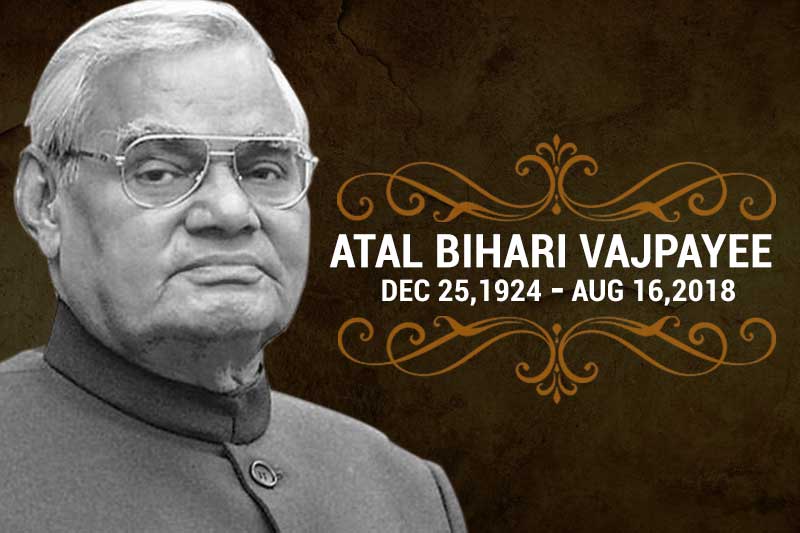Death of a statesman: Leader who always soft-spoke his mind
New Delhi: Atal Bihari Vajpayee’s liberal admirers sometimes described him as the right man in the wrong party. His critics called him a “mukhauta’’, a mask which hid his party’s harsh uncompromising Hindutva agenda. But it was his successor as prime minister, Manmohan Singh, who gave Vajpayee the epithet by which he will be remembered in history, “Bhishma Pitamah of Indian politics’’.
Polls rating the popularity of India’s prime ministers invariably place Vajpayee as among the tallest.
People close to Atalji, as he was called by those who knew him well, say the defining characteristics of the man was his humanism, humour, his love for poetry, food and music. And, above all, his pragmatism.
Born in Gwalior in 1924, Vajpayee was the son of a school-teacher and was attracted to the RSS while still in his teens. Along the way, he outgrew to some extent the rigid and narrow concepts of the organisation which groomed him in politics and had the farsightedness to spot his oratorical skills early in life. It is testimony to Vajpayee’s soft-spoken strength and conciliatory approach that he never broke with the RSS, as did some others, such as Balraj Madhok and Dr Raghuvira.
Ashoka University’s Vinay Sitapati, who is writing a book on the BJP before Modi, believes that this was because, “the RSS, like the Catholic church, allows a lot of latitude provided you don’t cross the line.’’ And being brought up in the Sangh culture, Vajpayee knew when to give in and when to get his way.
Only once did he seriously consider quitting the party. After the Babri Masjid demolition in 1992, Vajpayee refused to visit his party office to take part in the celebratory meetings at nearby Ashoka Road. I happened to be at his residence at that time and the gloomy atmosphere in the house reflected the uncertainty of his own future.
It was an up-and-down relationship with the RSS. For instance, March 1998, when his new Cabinet was being sworn in, should have been Vajpayee’s moment of glory. But his face was ashen. At midnight, he had received a call from then RSS chief K Sudarshan insisting that he replace Jaswant Singh as finance minister with Yashwant Sinha.
Vajpayee, as prime minister, had the last laugh. He steered his party’s dogmatic economic approach from its avowed socialist moorings to an unprecedented degree of liberalism, opening up several sectors of the economy and placing those who reflected his thinking in key ministerial slots.
 Dr Manmohan Singh with Atal Bihari Vajpayee. (Express Archive)
Dr Manmohan Singh with Atal Bihari Vajpayee. (Express Archive)
In 2002, after the Gujarat riots, the PM flew to Ahmedabad to visit Muslim refugee camps and sent out a subtle message to the then CM Narendra Modi of the need to practise Rajdharma. Before he left for the BJP’s national executive in Goa a few days later, it seemed Modi’s days as CM were numbered. But when Vajpayee addressed the party executive, the PM struck a different note, backing Modi all the way. On the flight to Goa, a minister had succeeded in making Vajpayee change his mind.
Closely intertwined with Vajpayee’s life story is that of his comrade-in-arms L K Advani, also a pracharak. The two were handpicked when they were very young by Deen Dayal Upadhyaya and the RSS to play a significant part in building up the infant Jana Sangh party, which was founded in 1951.
Their roles were clearly defined: Vajpayee was to be the star speaker who attracted the crowds; Advani, the backroom boy who looked after the organisation. After Deen Dayal Upadhyay’s death, Vajpayee became the face of the party. He was elected to the Lok Sabha for the first time from Balrampur, UP, in 1957, when he was only 34.
Pandit Jawaharlal Nehru was so impressed with the young, aggressive Parliamentarian who could put his government on the defensive that he predicted that the young man from the insignificant political party would one day become prime minister. In his long and impressive parliamentary career which spanned over half a century, Vajpayee was elected 10 times to the Lok Sabha and twice to the Rajya Sabha. He was acknowledged even by his foes to be an outstanding Parliamentarian, serving on many significant Parliamentary committees.
In 1980, after the faction-ridden Janata Dal broke up, Vajpayee and Advani together formed the Bharatiya Janata Party (BJP). As the BJP grew in strength through the 1980s, Advani, who held the position of party president for long, began to play a more dominant role spearheading the Ayodhya temple movement. At one point, Vajpayee was so completely sidelined that he lost his position as leader of the Opposition in Parliament to Advani in 1993.
Then, suddenly, in November 1995, Advani who was named but later exonerated in the hawala diaries, resigned his post on a matter of principle and, to the consternation and shock of the RSS leadership, announced publicly that Vajpayee would be the party’s prime ministerial candidate.
Vajpayee was sworn in as prime minister thrice. The first time for 13 days, the second time from 1998 to 1999 when his ally Jayalalithaa dumped his government, because he would not withdraw income tax cases against her. The third time he was elected in 1999, he almost completed a full term except that his deputy prime minister, Advani, under the advice of the late Pramod Mahajan, suggested an early election, hoping to take over as next prime minister.
Shortly after Vajpayee left office, he suffered a series of illnesses including a paralysing stroke and pneumonia which left him bedridden and semi-conscious in the last years of his life.
Vajpayee’s laid-back style and democratic spirit in always permitting his colleagues and officials to have their say, sometimes gave an impression that as prime minister he was not attentive to details. Particularly, as Vajpayee would be happily nibbling away at all the Lucknow delicacies placed before him. But he would suddenly jump into the argument with a prescient one-liner, very often humorous, which left his audience stumped. Shakti Sinha, his OSD when he was PM, notes that Vajpayee was extremely meticulous in analyzing and questioning during briefings.
Prodipto Ghosh, who worked with Vajpayee when he was foreign minister in Morarji Desai’s government, recalls how British Nobel Laureate Philip Noel Baker gave a stirring talk on why India should not develop nuclear weapons at a London meeting on disarmament chaired by Vajpayee. He listened politely but later remarked quizzically to his rather awe-struck aide, “Sab apne apne dhun ke pake hain” (Everyone looks after their own interests.)
As PM, Vajpayee paid much attention to India’s nuclear programme and oversaw the second nuclear tests at Pokhran. Another example of his dry wit was when there was persistent speculation in the party and government that he would opt out as PM and make way for Advani. Vajpayee commented dryly, “I am neither tired nor retired yet.’’
 Atal Bihari Vajpayee with MM Joshi and LK Advani. (File Photo)
Atal Bihari Vajpayee with MM Joshi and LK Advani. (File Photo)
Contrary to his party’s perceived hawkish position, Vajpayee was always keen to bring about peace in the neighbourhood. He stuck his neck out to start the first bus route from Amritsar to Lahore and travelled on the bus himself to set the tone. It was a different matter that Pakistan stabbed him in the back by quietly infiltrating into Kargil even as the two countries were engaged in peace talks.
Though a bachelor, Vajpayee adopted the family of Rajkumari Kaul, his fellow student at Victoria College in Gwalior. They came from very different backgrounds and went their separate ways after college. But years later, they caught up with each other in Delhi where Rajkumari’s husband Professor Kaul was head of the philosophy department at Ramjas College and warden of the hostel. Vajpayee interacted with the college students whenever he was in the Capital and many became his lifelong friends and admirers.
Some worked for him in government. One was Ashok Saikia who used to argue with him regularly describing his party as “fascist.’’ Vajpayee good humouredly laughed it off. Later, Saikia, as an IAS officer, became a key member of Vajpayee’s PMO. Vajpayee’s hands-on man was Brajesh Mishra, his principal secretary and National Security Adviser.
The measure of a man can be judged by the tributes he receives when he passes away. And the praise showered on Vajpayee from politicians and people across the political spectrum is testimony to his standing in India’s political life, a national leader who had mass appeal and enjoyed goodwill in all quarters. (Courtesy Indian Express)


Comments are closed.